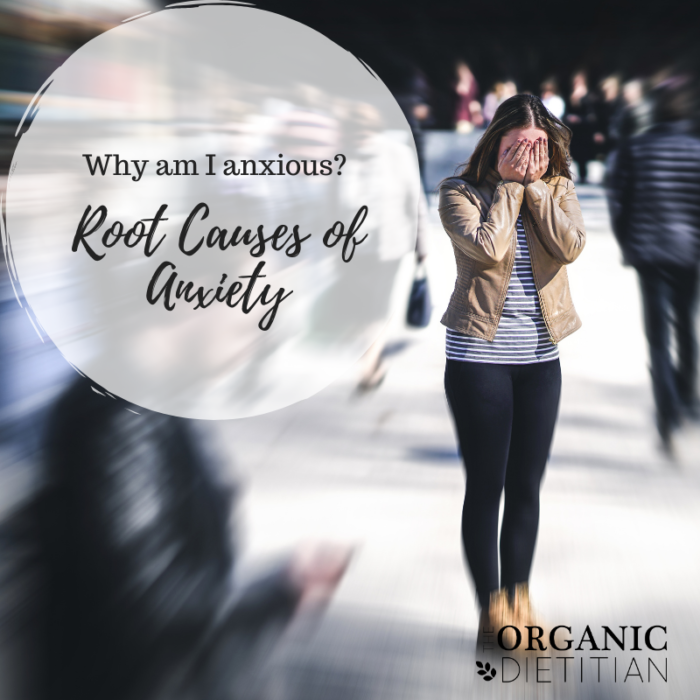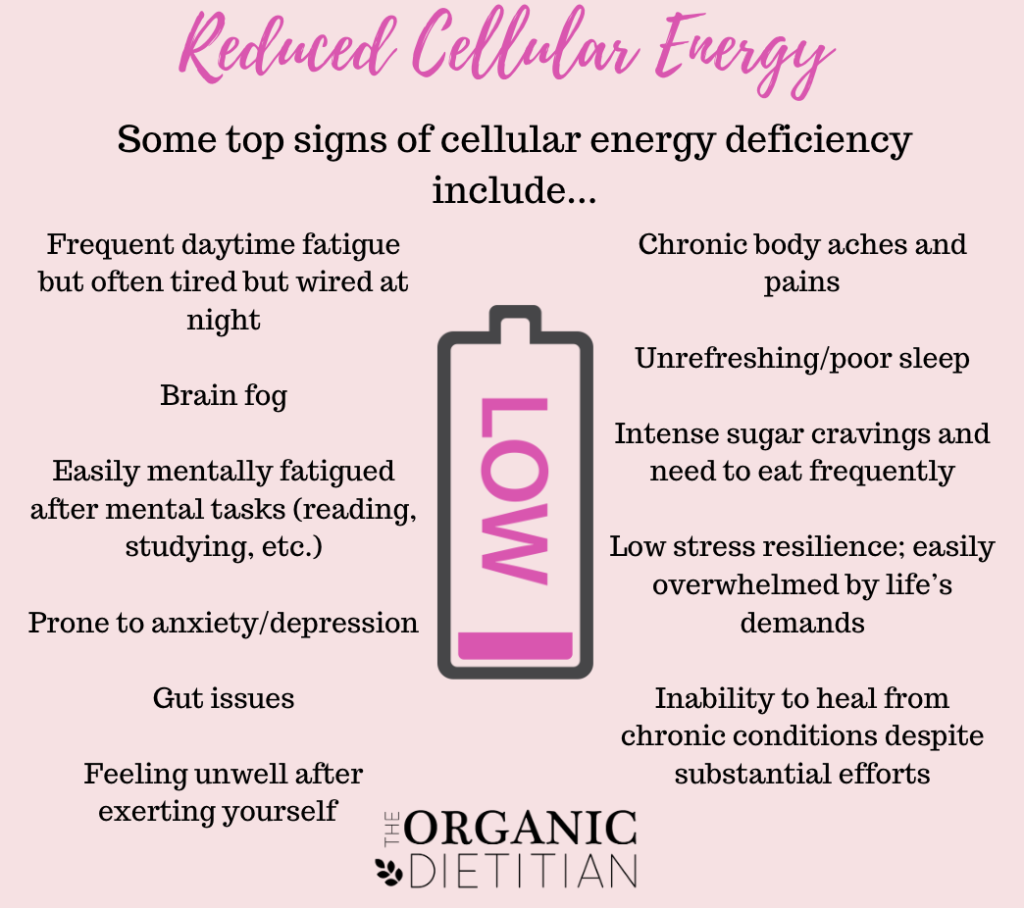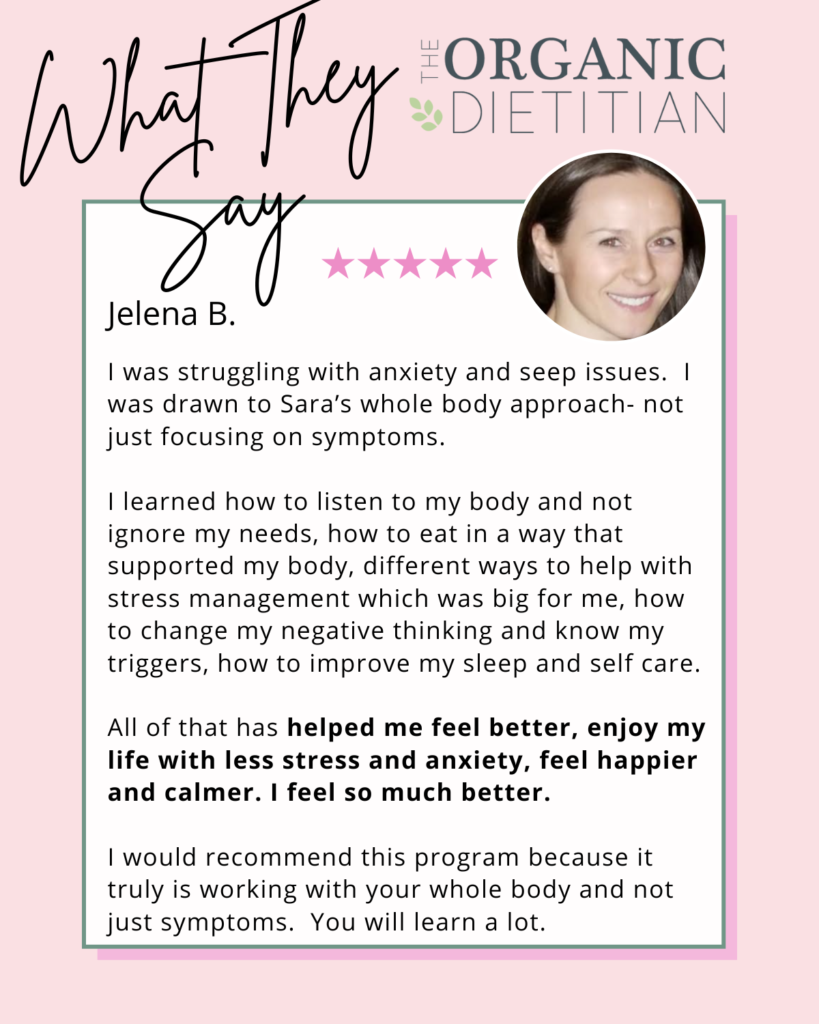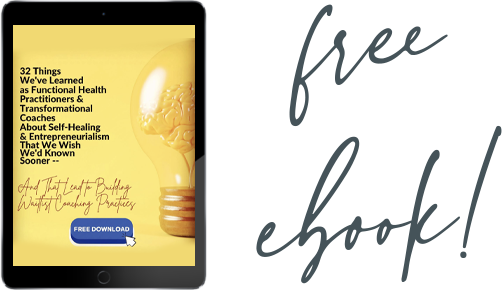17 December, 2020
Why am I Anxious? Root Causes of Anxiety

Do you struggle with anxiety?
If yes, you’re most definitely not alone. Anxiety is one of the top health complaints we hear from our clients. Anxiety disorders are incredibly common. They affect an estimated 40 million people in the United States, according to the Anxiety and Depression Association of America.
Needless to say, anxiety can have far-reaching effects. For so many of the women we work with, anxiety negatively impacts most areas of their lives — they can’t be as present with their loved ones, it impacts their productivity at work or home, they have a hard time being more social, and it generally prevents them from being truly happy with their lives.
Anxiety doesn’t just happen. It’s not a beast that chooses victims at random. It is an often exaggerated and uninvited response to a plethora of stimuli that can bombard our systems. While addressing the daily challenges and thought patterns can do wonders in managing anxiety, understanding its root causes lays the groundwork for a more effective, longer-term approach.
In this exploration, we’ll venture into the depths of anxiety, not only discussing its signs and symptoms but also shedding light on the intricate web of physical, mental, and environmental factors that can trigger and perpetuate this common but complex condition. We aim to empower those who suffer from anxiety, as well as wellness practitioners and health coaches seeking to support them, with a holistic understanding of the condition.
Anxiety and stress significantly impact physical health and well-being.
Breaking the anxiety cycle is crucial for overall health and well-being. Constant exposure to cortisol and adrenaline can be detrimental to our cells. The continuous release of these stress hormones can trigger inflammation cascades, leading to cellular wear and tear and potentially exacerbating physical symptoms.
Issues like unresolved anxiety and other mental health challenges that contribute to or worsen physical health conditions are commonly labeled as ‘psychosomatic,’ indicating a connection between the mind and physical symptoms. However, this term is frequently misused, especially in conditions like chronic fatigue syndrome, fibromyalgia, chronic inflammatory response syndrome, chronic Lyme disease, and more.
Although the term ‘psychosomatic’ can be distressing for those battling chronic illnesses, I now recognize how subconscious thoughts and behaviors can indeed impact physical health. Therefore, I strongly advocate for neural rewiring as a vital component in healing from chronic illnesses.
In my opinion, when chronic illness intersects with mental health issues (which is often the case), a more fitting term to describe this relationship would be ‘somatopsychological’. This term highlights how bodily physiology and biochemistry imbalances can influence mental well-being.
When the body experiences dysfunction and biochemical imbalances, it can lead to negative thought patterns, anxiety, and depression. Addressing these imbalances in conjunction with neural rewiring practices is essential to break the cycle of stress and illness.
The Issues In Our Tissues That Lead To Issues In The Mind
Let’s consider some of the main factors contributing to body imbalances.
The Stress Hormone Cascade
When you feel stressed, your body releases hormones like adrenaline and cortisol, known as stress hormones. These hormones initiate the “fight or flight” response, a survival mechanism hardwired into our systems. This heightened state of alertness was incredibly useful when beset by physical dangers in our evolutionary past. Yet, in our modern lives, we often juggle prolonged, low-level stressors that keep this system consistently activated, leading to overproduction and imbalance of these stress hormones.
Cortisol and anxiety share a cyclical connection. Anxiety, being a form of mental stress, triggers the release of cortisol. Conversely, excessive stress hormone levels can lead to anxiety and depression and increase the risk of experiencing an anxiety attack. Cortisol significantly impacts the brain, and factors that raise cortisol levels or reduce cortisol reduction can induce anxiety.
Low Cellular Energy
Energy—the currency of the cell—is essential for every physiological process.
To maintain optimal health, the mitochondria within our cells must function at their best, enabling the production of sufficient energy in the form of ATP. The body and mind can be negatively affected if our mitochondria become overwhelmed and impaired due to different stressors.

Related Post: Cell Danger Response: Is It Keeping You Sick and Tired?
Minerals and Anxiety
In reality, a combination of stress, trauma, and mineral imbalances could potentially result in long-term mental health issues like anxiety and depression.
Specific micronutrients serve as co-factors in numerous enzymatic processes in the body, and they are essential for producing neurotransmitters such as serotonin and dopamine.
Elevated copper levels and other mineral imbalances significantly contribute to anxiety. Individuals with low tissue levels of calcium and magnesium or a high sodium-to-potassium ratio are more prone to experiencing anxiety.
Nervous System Dysfunction
The autonomic nervous system operates in the background of our physiology, overseeing crucial functions like heart rate, breathing, digestion, muscle contraction, sexual function, and elimination. If this system becomes imbalanced, a scenario that is becoming more prevalent, it can lead to various physical and cognitive issues.
Unresolved Trauma
Past traumas can leave an indelible imprint on the nervous system, making an individual hyper-reactive to internal and external stressors. This heightened state of reactivity can perpetuate anxiety as the nervous system struggles to find a baseline level of balance and calm.
Vagal Tone and Anxiety
The vagus nerve, critical for the parasympathetic response, must be well-toned to counter the stress response effectively. Low vagal tone is associated with poor recovery from stress and is a common feature in those with anxiety disorders.
Related Post: Your Autonomic Nervous System: A Missing Piece to Your Health Journey
Blood sugar
Cortisol is the body’s primary stress hormone and helps regulate glucose (blood sugar) levels. Our cells cannot withstand being continually bathed in cortisol and adrenaline.
Hypoglycemia (low blood sugar) is a powerful HPA axis activator. Glucose is fuel for the brain, so the hypothalamus (in the brain and is the H on the HPA axis) is sensitive to falling blood sugar levels.
So, low blood sugar equals stress. Stress hormones released due to low blood sugar can lead to mental health conditions like anxiety.
Is it any wonder why so many people experience “hanger” or get anxious and jittery when their blood sugar levels drop!?
Eating balanced meals with whole food sources of carbs as tolerated, healthy fats, and quality animal protein is the best way to start balancing your blood sugar levels.
Related Post: How Blood Sugar Impacts Hormones + How to Start Restoring Balance
Inflammation
A number of studies have found a close correlation between low-grade inflammation and anxiety. “Biomarkers of inflammation such as inflammatory cytokines and acute-phase proteins are reliably elevated in a significant proportion of patients with [anxiety disorders], and maybe a causal factor driving behavioral symptoms.” (source)
As with blood sugar, diet is key here. Look to reduce processed foods as much as possible, and fill your plate with real, whole, nutrient-dense foods. Also, be sure to cut inflammatory “vegetable” oils and replace them with healthier alternatives like grass-fed butter, beef tallow, olive, and coconut oil.
Lifestyle can also drive inflammation up or help bring it down. Moderate daily restorative movement, emotional health, and 8-9 hours of quality sleep each night are essential.
Related Post: 4 Root Causes of Chronic Inflammation
Gut health
In recent years, study upon study has confirmed the intimate connection between gut health and mental health, including anxiety.
The gut produces many hormones and neurotransmitters and has its own nervous system. In fact, the small intestine has as many neurons as the spinal cord and contains more neurotransmitters than the brain. The gut also produces 95% of the body’s serotonin, the hormone that regulates mood.
The gut microbiome plays an especially important role in mood and mental health. Researchers have stated:
“Dysbiosis [an imbalance of good and bad bacteria in the gut] and inflammation of the gut have been linked to causing several mental illnesses, including anxiety and depression, which are prevalent in society today. Probiotics have the ability to restore normal microbial balance, and therefore have a potential role in the treatment and prevention of anxiety and depression.” (source)
Not surprisingly, then, one review of 15 human studies found that supplementing with probiotics for one to two months can improve anxiety, depression, obsessive-compulsive disorder (OCD), and memory.
But gut health rarely ends with popping a probiotic supplement — if only it were so simple!
Even healing the gut requires a mind, body, and spirit approach.
Hormonal imbalances
It’s no big secret that our hormones impact our mood. Many premenstrual, pregnant, and menopausal women can attest to this!
So, of course, hormonal imbalances can increase anxiety, stress, and depression.
Estrogen dominance, low progesterone levels, and thyroid imbalances (source) can all contribute to anxiety. When progesterone levels decline and are out of balance with estrogen, anxiety can appear. Progesterone is important for brain health and is a “feel-good” hormone. Low progesterone levels can be common when thyroid issues are present, but those with thyroid hormone imbalances can have higher incidences of anxiety.
Learn more in this related blog post: Is My Thyroid Really “Normal”?
Toxic overload
We are all exposed to thousands of toxic compounds each day via the food we eat, the water we drink, the air we breathe, the personal care and makeup products we put on our bodies, the household products we use to clean, and the buildings we live and work in. If we take in more toxins than our bodies can process, our body-mind will suffer.
The gut can be one of the biggest sources of internal toxicity, and a stressed nervous system can shut down detoxification. You can’t detox your way out of these other issues. Reducing your toxic load isn’t just about your external environment; you MUST address your internal environment.
Other toxins that can negatively impact our brains and health include toxic relationships and toxic thoughts.
10 Contributors to Anxiety You May Not Realize (yet are critical to be aware of)
- Being out of alignment with one’s divine design can apply to personal or professional scenarios. Example: Pursuing work that goes against one’s passions or strengths. Trying to do something that isn’t meant for you. Beating yourself up for not being good at it and continuing to be stressed out by it. Or forcing yourself to be good at it even if you don’t like it.
- Disconnection from meaningful work. Something that doesn’t bring fulfillment. Wishing you were doing something else.
- Burnout syndrome. Overdoing it. Compromising one’s values for way too long.
- Unresolved complex PTSD.
- Destructive thinking and personal patterns often stem from low self-worth, which often stems from unprocessed trauma. Negative emotions are a call to action and help to nudge you toward beneficial change. It takes just as much energy to maintain a limiting belief as it does to overcome it.
- Placing too much value on and/or defining one’s self-worth by popularity, achievements, and income.
- Lack of authentic, safe connection to others.
- Feeling powerless to change one’s circumstances or feeling hopeless.
- Disconnection with the rhythms of nature.
- Engaging in repetitive, destructive patterns that result in negative neuroplasticity, which again is often the result of unresolved trauma and past programming, which stems from low self-worth. Negative neuroplasticity is changes in the brain that result from negative experiences.
How many of these might resonate with you? It is important to note that these psychological factors often contribute to physiological factors, which is why healing most often requires a mind, body, and spirit approach. It goes way beyond lab testing and taking supplements. It requires deeper work.
Navigating and addressing the deeper root causes of anxiety can be complex, confusing, and frustrating when you try to go it alone. But it’s our job to educate and support the women we work with to navigate the journey.

Ready to dive deep into your health? To take a root cause approach to your anxiety? Get empowered to become your own best self-healer!
Now we want to hear from you!
What do you think now that you better understand these physical triggers of anxiety?
Do you think any could be contributing to your anxiety?
What steps will you take to start addressing them?
Any questions?
Please let us know in the comments below so we can keep the conversation going and best support you in your healing journey.















 80% of chronic dis-ease is rooted in stre
80% of chronic dis-ease is rooted in stre
 As
As 

Not only are the above root causes true, but also many people have hiatal hernias and don’t even realize it. This can cause diaphragm spasms which can cause great anxiety. I also have issues with a disregulated thyroid- which can also contribute!
Great insight. And I would ultimately say that the root causes of thyroid disregulation need to be addressed here. While thyroid issues might be a factor they ultimately aren’t the root cause because thyroid issues have root causes too.